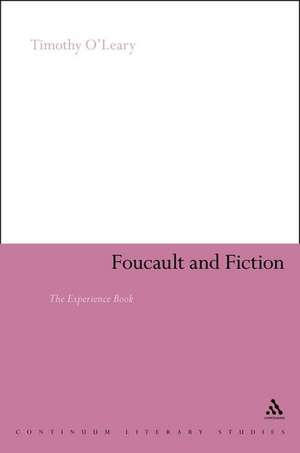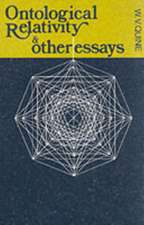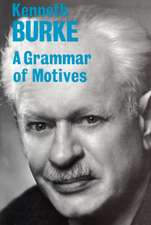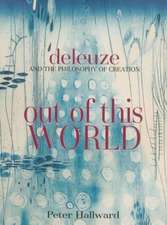Foucault and Fiction: The Experience Book
Autor Timothy O'Learyen Limba Engleză Paperback – 19 oct 2011
Foucault
and
Fictiondevelops
a
unique
approach
to
thinking
about
the
power
of
literature
by
drawing
upon
the
often
neglected
concept
of
experience
in
Foucault's
work.
For Foucault, an 'experience book' is a book which transforms our experience by acting on us in a direct and unsettling way. Timothy O'Leary develops and applies this concept to literary texts. Starting from the premise that works of literature are capable of having a profound effect on their audiences, he suggests a way of understanding how these effects are produced. Offering extended analyses of Irish writers such as Swift, Joyce, Beckett, Friel and Heaney, O'Leary draws on Foucault's concept of experience as well as the work of Dewey, Gadamer, and Deleuze and Guattari. Combining these resources, he proposes a new approach to the ethics of literature. Of interest to readers in both philosophy and literary studies, this book offers new insights into Foucault's mature philosophy and an improved understanding of what it is to read and be affected by a work of fiction.
For Foucault, an 'experience book' is a book which transforms our experience by acting on us in a direct and unsettling way. Timothy O'Leary develops and applies this concept to literary texts. Starting from the premise that works of literature are capable of having a profound effect on their audiences, he suggests a way of understanding how these effects are produced. Offering extended analyses of Irish writers such as Swift, Joyce, Beckett, Friel and Heaney, O'Leary draws on Foucault's concept of experience as well as the work of Dewey, Gadamer, and Deleuze and Guattari. Combining these resources, he proposes a new approach to the ethics of literature. Of interest to readers in both philosophy and literary studies, this book offers new insights into Foucault's mature philosophy and an improved understanding of what it is to read and be affected by a work of fiction.
| Toate formatele și edițiile | Preț | Express |
|---|---|---|
| Paperback (1) | 255.38 lei 6-8 săpt. | |
| Bloomsbury Publishing – 19 oct 2011 | 255.38 lei 6-8 săpt. | |
| Hardback (1) | 889.08 lei 6-8 săpt. | |
| Bloomsbury Publishing – 26 aug 2009 | 889.08 lei 6-8 săpt. |
Preț: 255.38 lei
Nou
Puncte Express: 383
Preț estimativ în valută:
48.87€ • 53.07$ • 41.05£
48.87€ • 53.07$ • 41.05£
Carte tipărită la comandă
Livrare economică 23 aprilie-07 mai
Preluare comenzi: 021 569.72.76
Specificații
ISBN-13: 9781441182104
ISBN-10: 1441182101
Pagini: 192
Dimensiuni: 156 x 234 x 10 mm
Greutate: 0.26 kg
Editura: Bloomsbury Publishing
Colecția Continuum
Locul publicării:London, United Kingdom
ISBN-10: 1441182101
Pagini: 192
Dimensiuni: 156 x 234 x 10 mm
Greutate: 0.26 kg
Editura: Bloomsbury Publishing
Colecția Continuum
Locul publicării:London, United Kingdom
Caracteristici
Many
academic
studies
have
approached
Foucault
from
the
perspective
of
other
disciplines
(e.g.
social
theory,
politics,
gender
studies)
-
this
study
takes
Foucault
seriously
as
a
philosopher
of
literature
and
experience.
Notă biografică
Timothy
O'Leary
is
Assistant
Professor
of
Philosophy
at
the
University
of
Hong
Kong.
He
has
spent
several
years
working
in
the
Foucault
Archives
and
has
published
on
Foucault,
aesthetics
and
literature.
He
is
the
author
ofFoucault
and
the
Art
of
Ethics(Continuum
2006).
Cuprins
Acknowledgements
1. Literature, experience, and ethics
2. The ungoverned tongue: Seamus Heaney
3. Foucault's turn from literature
4. Language, culture, and confusion: Brian Friel
5. Foucault's concept of experience
6. Re-making experience: James Joyce
7. Experimental subjects: Swift and Beckett
8. Ethics and fiction
Bibliography
1. Literature, experience, and ethics
2. The ungoverned tongue: Seamus Heaney
3. Foucault's turn from literature
4. Language, culture, and confusion: Brian Friel
5. Foucault's concept of experience
6. Re-making experience: James Joyce
7. Experimental subjects: Swift and Beckett
8. Ethics and fiction
Bibliography
Index
Recenzii
"An
insightful
exegesis
of
an
ethics
of
fiction,
an
art
that
transforms
readers'
experience
of
the
world
by
daring
them
to
think
differently...
Foucault
and
Fiction
demonstrates
from
the
outset
that
O'Leary
is
deeply
familiar
with
Foucault's
work
on
literature,
experience
and
ethics,
and
perceptively
links
the
transformative
effects
of
literature
with
ethical
practices
of
the
self...
I
highly
recommend
this
book
for
readers
interested
in
the
work
of
Michel
Foucault,
literature
theory
and/or
Irish
literature.
But
I
also
endorse
this
book
for
those
fascinated
with
how
reading
catalyses
a
?transformative?
experience,
an
experience
that
can
change
your
world
in
one
,shocking
or
arresting?
moment
or
gradually,
through
the
passing
of
time.
Foucault
and
Fiction
is
pleasurable
to
read
and
astute
in
its
use
of
philosophy,
literature
theory
and
reception
studies.
It
is
an
integral
text
for
anyone
struggling
to
reconcile
how
art,
ethics
and
politics
merge
in
the
transformative
potential
of
literature"
"Looking at literature in relation to experience and ethics, O'Leary ponders whether a novel, a poem, or a play can really make someone think differently about things, and if so, how it does. He takes a model of ethics from French philosopher Michel Foucault (1926-84). Among his topics are literature, experience, and ethics; the ungoverned tongue in Seamus Heaney; Foucault's turn from literature; language, culture, and confusion in Brian Friel; Foucault's concept of experience; James Joyce remaking experience; the experimental subjects of Swift and Beckett; and ethics and fiction." -Eithne O'Leyne, BOOK NEWS, Inc.
"Looking at literature in relation to experience and ethics, O'Leary ponders whether a novel, a poem, or a play can really make someone think differently about things, and if so, how it does. He takes a model of ethics from French philosopher Michel Foucault (1926-84). Among his topics are literature, experience, and ethics; the ungoverned tongue in Seamus Heaney; Foucault's turn from literature; language, culture, and confusion in Brian Friel; Foucault's concept of experience; James Joyce remaking experience; the experimental subjects of Swift and Beckett; and ethics and fiction." -Eithne O'Leyne, BOOK NEWS, Inc.
















